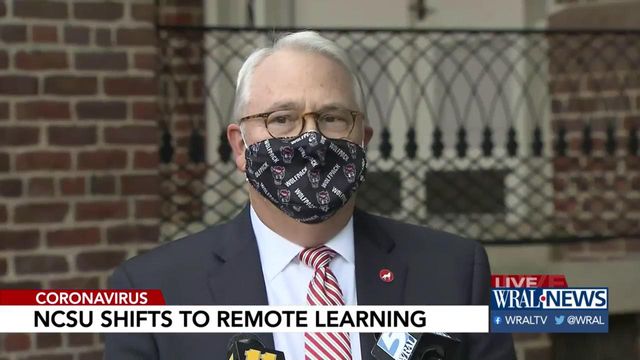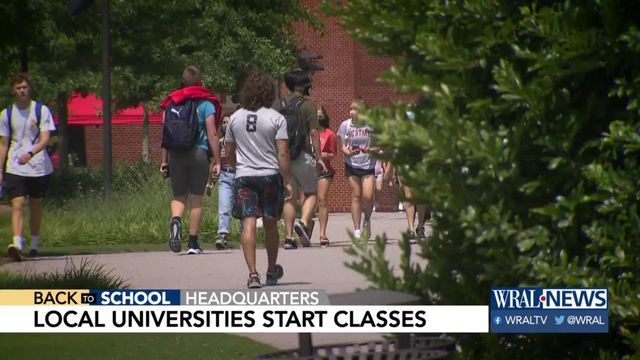NC State chancellor disappointed, says large parties may be to blame for online classes
North Carolina State University Chancellor Randy Woodson said large parties may be to blame as undergraduate classes move to all-online.
Posted — UpdatedSome students who just moved into their dorms weeks ago are now moving back home to learn remotely starting Monday.
Woodson said he is disappointed in-person classes didn't work. In a message to students and faculty, the chancellor said people did not take personal responsibility. He also heard reports of large parties off campus.
Three clusters with five or more cases have been reported at the school, and seven Greek houses are quarantined. In all, more than 500 students are in quarantine or isolation.
Students are allowed to stay on campus for their online classes, but many will move out and get a partial refund.
Woodson said all undergraduate classes at N.C. State will be taught online starting Monday while graduate courses and clinical education classes will be allowed to meet in person or in a hybrid format.
The university's research laboratories will remain open and fully operational.
On-campus housing
Students who choose to move home will be allowed to cancel their university housing contract without penalty. Students will also be reimbursed a prorated amount for housing and dining based on the number of days they lived on campus.
Parties and large gathering concerns
Woodson said the Raleigh campus has seen the negative impacts of students not taking personal responsibility during the pandemic.
He explained they've received reports of large parties in off-campus apartments. In the last two days, three coronavirus clusters have been identified in off-campus and Greek Village houses that could be traced to parties.
Thursday afternoon, NCSU announced two additional clusters, which means five or more cases in a single spot, had been found.
The first cluster was at the Sigma Phi Epsilon fraternity house. The second is connected with two private residences in Raleigh. Those residences have five positive cases between them that have been epidemiologically linked through contact tracing.
On Thursday, the university said more than 500 students are in quarantine or isolation who have either tested positive or been in contact with someone who as tested positive. The majority of the students in quarantine or isolation are off-campus.
Woodson said he was 'disappointed' in the students who had contributed to the decision to move classes online.
"The behavior of a few has jeopardized the ability to go forward for all of our students, in a way that many of our students wanted," he said.
Woodson said there were very limited things the university could do to manage behavior in off-campus apartment complexes, but state mandates could help.
"Many of those apartment complexes that many of our students live in have policies that they have to abide by. They're not our [policies], they're the state's [policies.] We think there's some opportunities there."
As coronavirus clusters, five or more cases in one spot, were announced by the university, Wake County medical director Kim McDonald urged students to take steps to stop the spread.
In a statement, she said, "this won’t be the last we hear of clusters popping up on college campuses as classes start up again."
Students, staff reaction to online shift
NCSU student Andrew Page said he was attending an in-person class when he got the news all classes would move online Monday.
"The teacher, she handled it pretty well. She responded by telling us what the new schedule was supposed to be, how we were going to conduct our testing online," said Page.
Page said he wasn't surprised at the university's announcement.
"I had a feeling when we were coming into the school year that we were eventually going to be leaving," said Page. "It seemed like if you put this many kids close together during the time of a pandemic it was bound to happen."
"People aren't taking it seriously enough...there have been parties and stuff going on," said sophomore Maddie Blume. "Not to the extent they would've been last year or anything like that because a lot of people are taking it seriously, but I do worry especially with all the breakouts in Greek life and everything."
Other students were frustrated with the university's announcement.
"I just see this as more as just a money-grab. They got us here, they got us fully scheduled," said Michaels Evers-Daley, a senior at NCSU.
While many students are thinking about what’s next, Evers-Daley is focused on the past, believing this could’ve been avoided by going online in the first place.
"It would've been the truthful and the fair thing to do. Now, you have a bunch of kids who are continuing and expanding their debt when they're not truly getting what they invested in," he said.
For some on campus, this will not change much of their current college experience.
"My classes are online, so it doesn't really affect me," said Caitlin Garrison, an NCSU student.
NCSU professor Dr. Julie Swann said it's not the semester everyone wanted it to be, but it was a decision that had to be made.
"If students had not been congregating in parties and social gatherings with more than 10 people, then we could have kept this at bay," said Swann.
Swann said it would be tough to expect students not to be this way, but she hoped some universities could show how it was done.
"My hope is that universities that start later will have a bit more time to make sure that their students are on board with plans, that students understand the ramifications," she said.
Related Topics
• Credits
Copyright 2024 by Capitol Broadcasting Company. All rights reserved. This material may not be published, broadcast, rewritten or redistributed.






